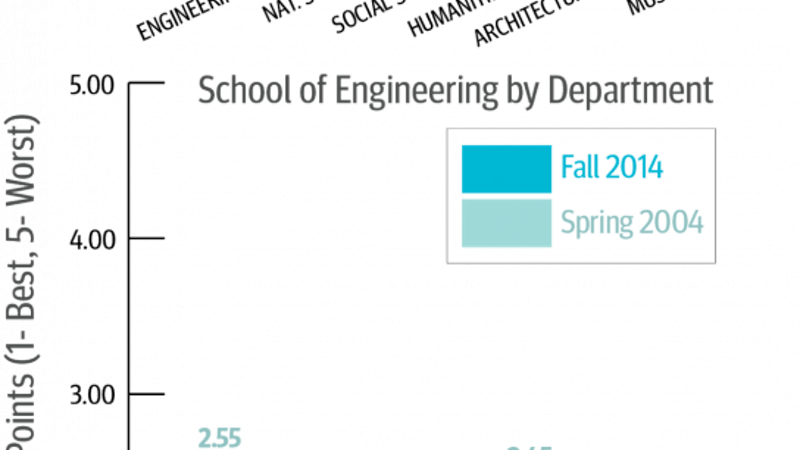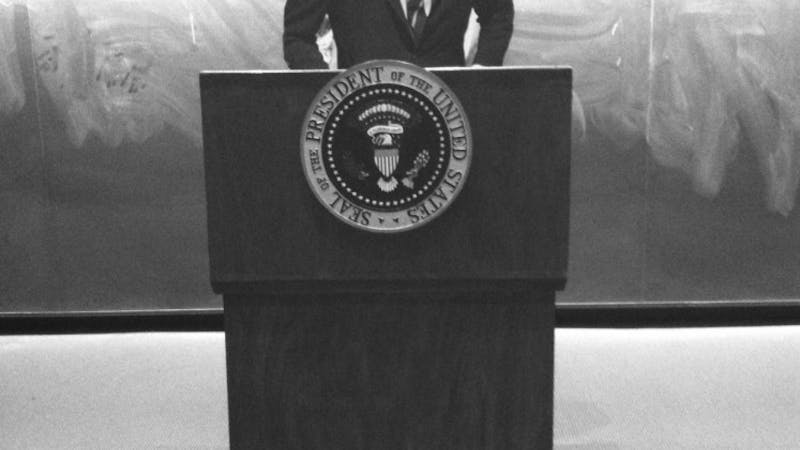NEWS
11/12/14 8:05am
By Miles Kruppa and Tina Nazerian
In light of a greater conversation in academia about the rights and roles of non-tenure track faculty, Rice University is reconsidering their titles, obligations and job security.According to the Rice Faculty Handbook, “academic tenure protects faculty members from being dismissed for teaching, researching or inquiring into areas that might be politically or commercially controversial.” However, NTT faculty do not have tenure and are not on paths that potentially lead to tenure within the university.The Faculty Senate approved the Task Force on Non-Tenure Track Faculty’s five recommendations to increase job stability and growth opportunities for non-tenure track faculty while more clearly defining their roles at its meeting on Oct. 1. Paula Sanders, vice provost for academic affairs, and Stanislav Sazykin, senior faculty fellow in physics and astronomy, presented the five recommendations at the Student Association Senate meeting on Wednesday, Nov. 5. The task force’s primary recommendations were to create full-time NTT teaching and research positions with the titles of Assistant, Associate and (full) Teaching/Research Professor. The other three recommendations were to clarify the titles and roles of lecturers and instructors, limit the use of the “Professor in the Practice” title and allow the Schools of Business, Music and Architecture to develop their own NTT titles. Trends in NTT FacultyThe recommendations come in the wake of a greater discussion in academia about the roles and treatment of NTT faculty, according to Sanders, a professor of history.Nationwide, NTT positions account for 76 percent of all instructional staff appointments in American higher education, according to the American Association of University Professors. According to the Office of Institutional Research, in fall 2013, NTT faculty taught 38 percent of undergraduate courses at Rice compared to 45 percent TTT faculty and 15 percent other instructors. Additionally, in fall 2013, TTT faculty made up 71 percent of instructional faculty on a Full-Time Equivalent basis, compared to 29 percent NTT faculty. The OIR calculates FTE by adding all the full time TTT faculty to one-third of part time TTT faculty. “Many universities have used more and more contingent faculty, meaning faculty who are part time, have no benefits and have no job security, to carry out their undergraduate teaching mission,” Sanders said. “At Rice, the majority of our faculty continue to be TTT, tenured and tenure track faculty.” Sanders said Rice also has a number of full-time faculty who are NTT and have served the university well for a long time and that Rice actively attempts to employ full-time NTT faculty whenever possible. She said there are organizations in higher education, like the AAUP, that have called for universities to take measures similar to those in the recommendations. “There are lots of places where you have individuals who will piece together a living,” Sanders said. “They teach at three to five institutions, they teach a gazillion courses, they get paid almost nothing, they have no benefits. That’s a terrible situation. It’s a bad situation for those people, it’s a bad situation for a university.”An NTT faculty member, who asked to be anonymous for their job protection, said one of the main concerns of NTT faculty nationwide is that their expiring contracts will not be renewed. “One effectively doesn’t have to be fired; one’s contract only need not be renewed,” the NTT faculty member said. “So that’s kind of how the employment situation works for NTTs.”The NTT faculty member said they think one of the arguments in favor of moving toward the sorts of recommendations the task force endorses is to encourage academic freedom in teaching and research. “I’m not suggesting that NTTs don’t have that, because I think that most NTTs function in their positions as if though they do have academic freedom,” the NTT faculty member said. “You’re at a university, you assume you have academic freedom. But one of the broader concerns that’s been expressed in the country by many organizations that are looking at these issues is academic freedom, in addition to the issue of employment security.”The NTT faculty member said the task force’s recommendations will not only benefit NTTs, but will benefit the campus at large, in particular students. “If you look at countrywide trends, NTTs are an integral part of universities,” the NTT faculty member said. “I don’t see that changing, I don’t see that landscape changing. NTTs are people, basically, who have dedicated their careers to either doing teaching or research, but not both. The fact that Rice put together this task force and recommendations, a year in the making, shows that Rice is acknowledging the role that NTTs play in the overall academic experience at Rice.”Sanders said the new policies will make Rice more competitive for hiring the best NTT faculty and retaining them.“We ... wanted to ensure that we are able to hire and retain the highest quality faculty for everything we do at Rice, from our [tenured and tenure track] positions where tenure track faculty have the responsibilities for research, teaching and service, all the way through the whole range of faculty who teach full time or even part time mostly for our undergraduates,” Sanders said. “If we want to recruit and retain the best faculty, we have to have jobs that are appealing for people.”ImplementationAccording to Sanders, the task force decided to put management, planning and implementation issues in a separate document that the Faculty Senate did not vote on, but serves as a record of issues that have been raised for consideration and discussion by the administration. She said her highest priority is the full implementation of the recommendations by June 30, 2016.“We decided that we would put a lot of other things that are not really governance issues, but management and planning and implementation issues, in a separate document so that they would be there, so that they would be on the record of things that people wanted to have considered,” Sanders said. Sanders said the task force did not discuss compensation.“There are compensation questions that our committee did not address,” Sanders said. “And those are things that are going to have to be addressed down the road.”According to Sanders, issues such as whether or not NTT faculty will be eligible to become college masters and whether or not NTT faculty should have sabbaticals will be discussed during the implementation phase.“There are questions about what privileges and rights [and] entitlements different categories of employees should have,” Sanders said. “Having these principles doesn’t mean everybody should have exactly the same entitlements for their role.”At the Faculty Senate meeting on Oct. 1, Senator Mike Wolf said the wording “While not required, the record of scholarship and professional activity outside the university … should be considered in the promotion and renewal process” is problematic given the definition of NTT teaching roles. “Is such activity a part of the job description or is it not?” Wolf, a professor of mathematics, said. “If it is not part of the job, it has no role in promotion and renewal. If it is part of the job, then those activities need to be included in the job description — currently centered on teaching, teaching-related activities and service — and there need to be provisions made so that all candidates have a fair and adequate opportunity to engage in those activities.”According to the Faculty Senate meeting minutes, Sanders replied by saying the task force felt it was reasonable to say that scholarship could be part of the total assessment of NTT faculty, but it was not required, and that the goal is to create a career track for NTT faculty. In an email, Sanders said the conversation with Wolf was centered on making sure that all the requirements and criteria for evaluation and promotion would be included in the job description. She said the conversation was not a definitive discussion of the issue, and the task force’s feeling that it was reasonable to say scholarship could be part of NTT faculty’s total assessment was not a position that she personally espouses. Susan McIntosh, Committee on Undergraduate Curriculum chair, said NTT faculty bring diverse expertise in teaching and research to the undergraduate student body. “The NTT initiative serves to ensure fair treatment of our valuable NTT faculty, creating career tracks in those cases where their teaching skills contribute to the undergraduate program on a long-term basis,” McIntosh said. “NTT is not a single, monolithic category and can’t really be discussed as such. NTT faculty bring a wide variety of qualities and benefits to our undergraduate curriculum.”




